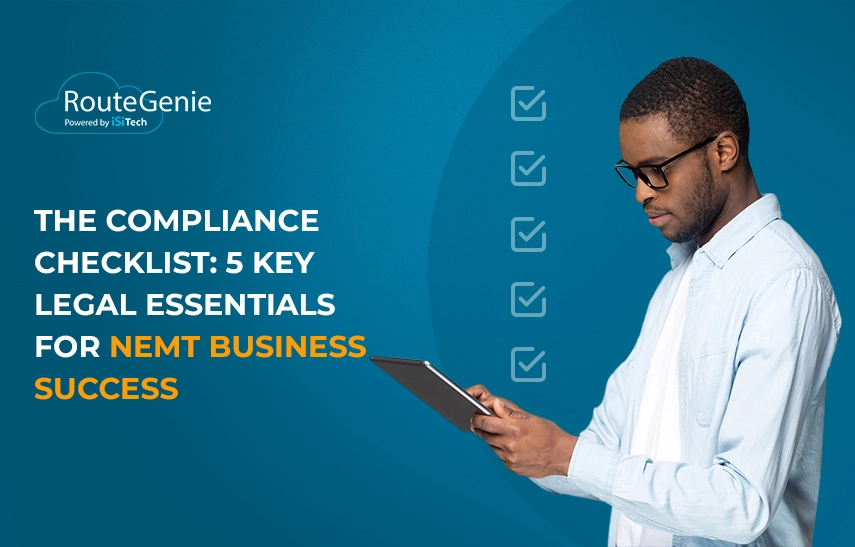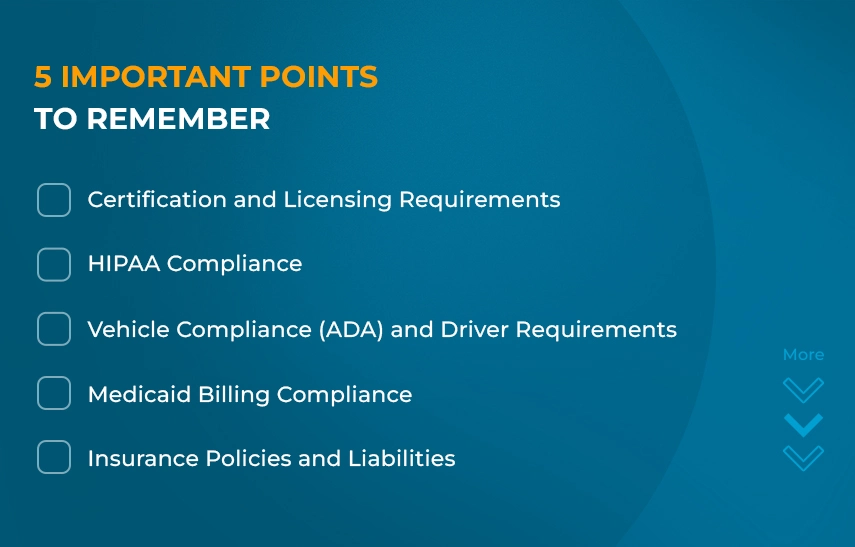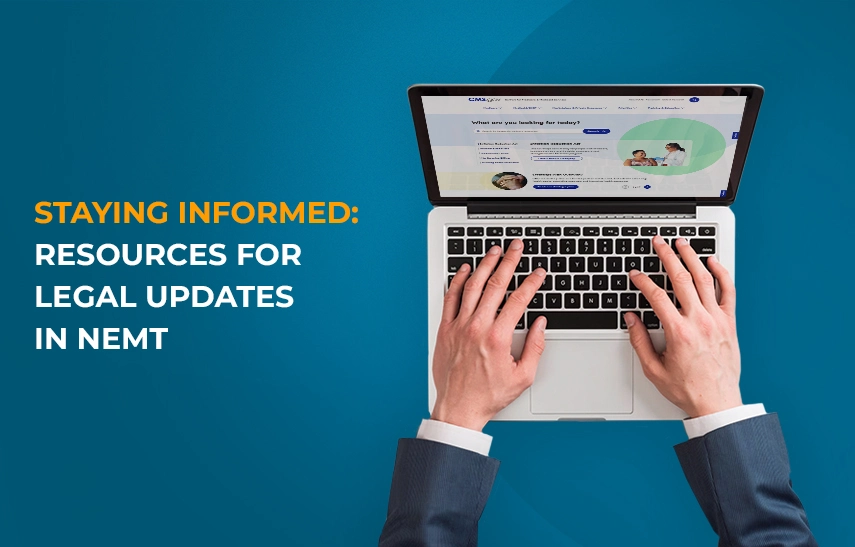The Compliance Checklist: 5 Key Legal Essentials for NEMT Business Success

US states are legally mandated to provide NEMT service to Medicaid beneficiaries. However, state-managed NEMTs are still unable to fully satisfy the transportation demands of certain disadvantaged communities.
State governments recognize this problem, so they turn to the private sector to bridge this gap. Private NEMT operators are instrumental in serving populations that need medical transportation to get to medical appointments but have limited access. Though independent, their operating within the healthcare system comes with a certain set of responsibilities and requirements to meet specific criteria.
Contents:
- Why Are NEMTs Subject To Strict Regulations?
- 5 Important Points To Remember
- Staying Informed: Resources for Legal Updates in NEMT
- Conclusion
Why Are NEMTs Subject To Strict Regulations?
NEMTs serve vulnerable populations like the sick, elderly, and persons with disabilities. Their services and the conditions of their passengers involve legal liability. Additionally, the state program affects their operating subsidies.
Non-emergency transportation providers must follow federal, state, and local regulations. These guidelines safeguard passenger safety and convenience. The requirements mostly involve service quality and reporting. They ensure vehicle accessibility, NEMT vehicle safety, and dependability during passenger use.
For any NEMT provider, understanding the regulatory landscape is essential—not only to meet compliance standards but also to build credibility and trust in the healthcare sector. Your NEMT business plan and roadmap for growth require awareness of these relies and regulations.
This roadmap covers five core areas that NEMT business owners should understand to navigate the legal terrain effectively.
5 Important Points To Remember

1. Certification and Licensing Requirements
State-specific Medicaid programs and NEMT regulations vary. It's vital to check with state agencies like your local health services department on the type of licenses and certifications that your business and employees will have to obtain. Additionally, you'll need to fulfill standard requirements across the US States. This is necessary to receive a business license and operate within the NEMT industry.
Federal, state, and local certifications are often required, including business licenses, insurance approvals, and driver-specific certifications such as CDL endorsements or CPR training. Familiarizing yourself with both state and federal guidelines and having clear records of all necessary licenses is key to smooth operations.
2. HIPAA Compliance
The Health Insurance Portability and Accountability Act (HIPAA) is a U.S. federal law designed to safeguard the privacy and security of individuals' Protected Health Information (PHI). Since NEMT providers often handle sensitive data related to patient appointments and care needs, they fall under the requirement for HIPAA compliance.
Here are the key practices to maintain HIPAA standards:
PHI Handling: Securely store, transmit, and manage patient details to protect privacy.
HIPAA-Compliant Software: Use software with features like encryption, access controls, and audit trails to keep PHI confidential. NEMT software like RouteGenie can also help with automated routing, dispatch, and scheduling; it can remind management when vehicle maintenance is due. Moreover, the client and driver app enables seamless communication, billing, and payment.
Staff Training: Ensure all employees understand HIPAA standards to handle patient data properly and reduce breach risks.
Data Security Protocols: This requirement mandates the implementation of robust security practices like password management, limited data access, and regular compliance audits.
Adhering to HIPAA not only prevents legal penalties but also builds trust with patients and healthcare providers by ensuring that their information remains private.
3. Vehicle Compliance (ADA) and Driver Requirements
Fleets for NEMT service usually include minivans and full-size vans. These are modified to ensure accessibility, safety, and passenger comfort. Federal and state governments mandate specific NEMT vehicle business requirements, plus regulations for equipment standards and regular maintenance.
Most NEMT passengers struggle with mobility issues. Hence, you should strive to fulfill the conditions of the Americans with Disabilities Act (ADA). Compliance with this Act becomes a legal responsibility if a private NEMT business scales up and has over 15 employees. The requirements may vary per state, but the general standards focus on door dimensions, safety equipment, and additional hardware.
Apart from basic ADA requirements, to complete specific NEMT trips, providers may also need durable medical equipment (DME). These include mobility aids, respiratory care, monitoring devices, and more. Such provisions enhance your service and passenger experience, making them worth the investment. You can also provide luxury NEMT service to expand your market.
As mentioned, driver qualification requirements vary by state but the general standards include specialized training in assisting passengers with special needs and operating equipment. NEMT drivers are also mandated to submit to physical examination to assess if they are fit to do their jobs. This is important since they're required to assist the elderly, persons with disabilities and passengers with chronic diseases. They are also subject to drug testing, as NEMT has zero tolerance for substance abuse. Laws also require NEMT companies to perform extensive background checks before hiring drivers. This allows them to be aware of criminal records and tendencies, behavioral issues, etc.
4. Medicaid Billing Compliance
Medicaid billing compliance is an essential part of the legal roadmap for NEMT businesses. The majority of users of non-emergency medical transportation services are Medicaid beneficiaries. This government program obliges providers to adhere to strict billing and documentation standards set by the Centers for Medicare & Medicaid Services (CMS) and state Medicaid agencies. This includes correct billing codes, detailed trip documentation, and compliance with fraud prevention measures. Proper Medicaid billing facilitates timely and accurate reimbursements for the providers, allows them to avoid legal complications, and builds trust with state health agencies.
5. Insurance Policies and Liabilities
Comprehensive insurance coverage is both legally required and critical for business continuity of NEMT providers. Having a robust policy not only safeguards against financial losses but also meets legal requirements for protecting employees and passengers alike. Essential policies include general liability, commercial liability, professional liability (errors and omissions) insurance workers’ compensation insurance, and umbrella insurance (provides additional coverage beyond primary policies for larger claims).
A well-rounded insurance plan protects NEMT businesses from unexpected costs, ensuring smooth operations. Working with an NEMT-savvy insurance advisor can help tailor policies to the specific needs of the service.
Staying Informed: Resources for Legal Updates in NEMT
 Unfortunately, it is not enough to set up your NEMT business within the legal framework just once and permanently forget about the headache. Laws and compliance requirements change all the time, so it is vital to stay informed about the latest legal and regulatory updates. Here are some key resources that can help you stay up-to-date with compliance standards and maintain high quality of service:
Unfortunately, it is not enough to set up your NEMT business within the legal framework just once and permanently forget about the headache. Laws and compliance requirements change all the time, so it is vital to stay informed about the latest legal and regulatory updates. Here are some key resources that can help you stay up-to-date with compliance standards and maintain high quality of service:
Federal and State Government Websites: This should be your first go-to place with the most reliable information on the legal aspects of conducting NEMT services. The Centers for Medicare & Medicaid Services (CMS) website regularly updates policies, regulations, and guidelines for Medicaid, which is essential for NEMT providers serving Medicaid beneficiaries. These updates are crucial for ensuring that services meet federal and state Medicaid guidelines and continue to receive proper funding and support.
The U.S. Department of Transportation (DOT) will provide information on the latest vehicle standards and regulations, including those relevant to NEMT services.
For state-specific regulatory updates, NEMT providers should regularly check with their local state Medicaid or Department of Health websites. These sites provide up-to-date legal requirements for operating within each state’s healthcare system.
Industry associations and advocacy groups like Non-Emergency Medical Transportation Accreditation Commission (NEMTAC) also belong to a leading resource for NEMT providers looking to stay up-to-date on standards, certification processes, and legal regulations. NEMTAC offers valuable resources to help providers meet best practices and comply with industry regulations.
There are multiple online resources that aggregate information on legal and compliance matters of running an NEMT company. Providers handling sensitive patient information can address the database and articles of the HIPAA Journal. They offer critical insights into healthcare data protection laws.
By utilizing these resources, NEMT providers can stay well-informed on the evolving legal landscape, ensuring they remain compliant with all regulatory requirements and continue to deliver high-quality, safe, and reliable transportation services.
Conclusion
The success of NEMT businesses hinges a lot on compliance and their commitment to rendering excellent service. It’s wise to consult legal experts to stay informed on evolving regulations, enabling your business to stay compliant and continue delivering reliable, safe transportation.
If you are wondering how to grow NEMT business, it is advisable to utilize technology as a vital tool for raising the level of your service and minimizing business risks. Having an NEMT business is rewarding in many ways, but it begins with taking your role as a promoter of public health seriously and within the established legal framework.
About the author
An experienced content writer, Keren Dinkin’s forte is writing well-informed medical transportation, healthcare accounting, and related articles. Her work is backed by months of intensive research and pays meticulous attention to details. In addition to being a writer, she also dons the hat of a content strategist.